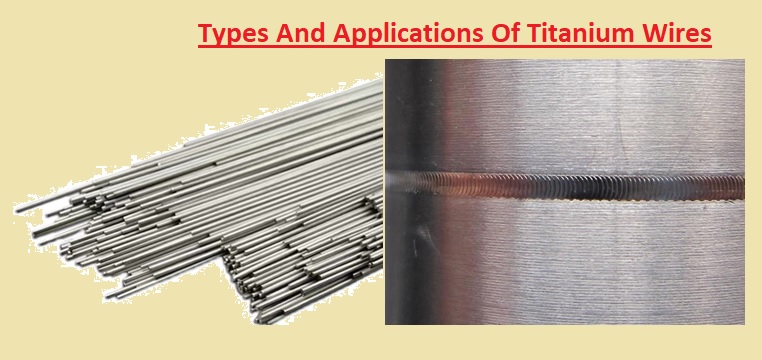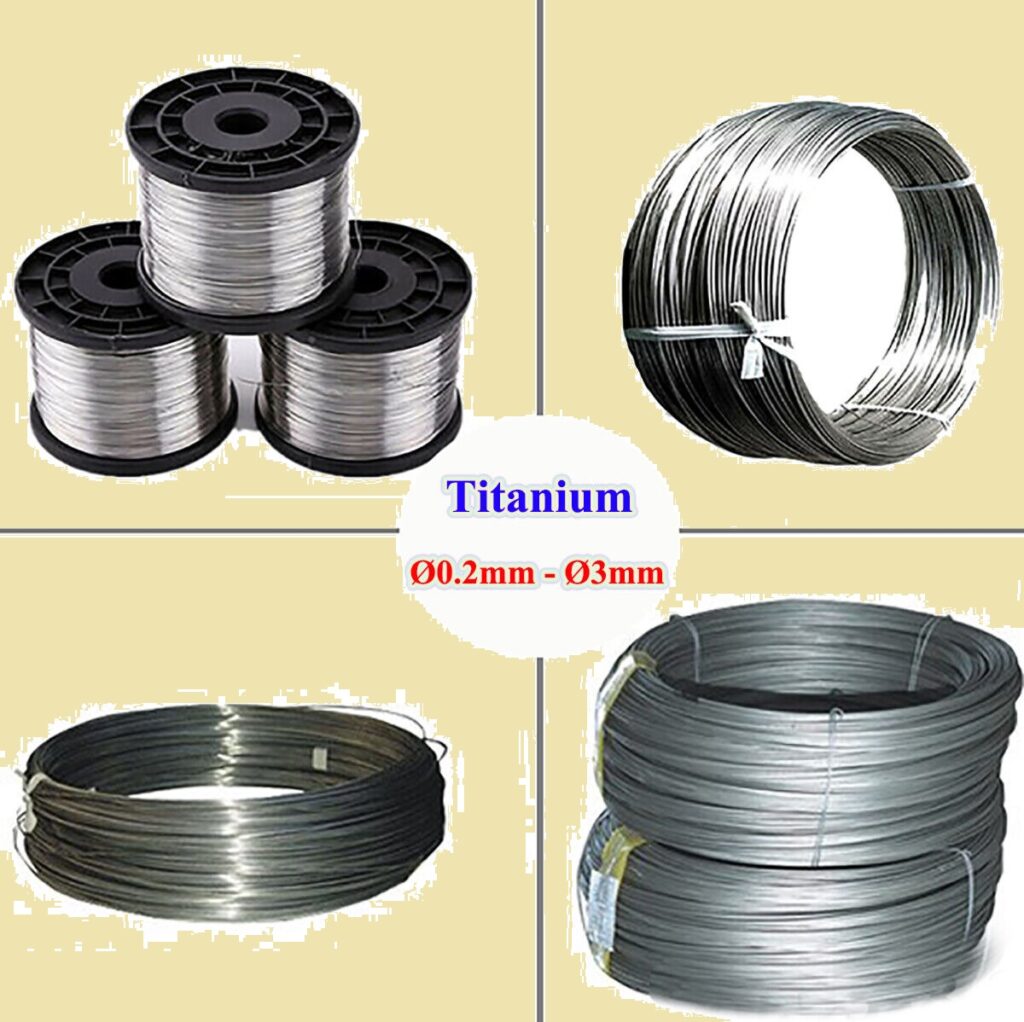Hello friends welcome to the new post. Here we will learn the Types And Applications Of Titanium Wires- Detailed Guide. Different types of titanium wires come with different uses. Such as pure titanium glass wire used for the creation of glass holders, titanium hanging wire used for hanging weight and titanium nickel alloy wire used for memory alloy material. This comprehensive detail will find the types and applications of titanium wires in 2024 and discuss the features and the wide array of uses they provide. Let’s discuss Types And Applications Of Titanium Wires
Introduction to Titanium Wires
Titanium is a silver-white metal that comes with good features. As density of titanium is about 4.54g/cm3, which is 43 percent lighter than steel and it has mechanical strength like steel.
Titanium is resistant to high temperatures and its melting point is 1942k about 500k larger thatn steel.
Nowadays products are made with the use of titanium-like titanium wires.

Types of Titanium Wires
Based on titanium wire and titanium alloy wires titanium wires come with pure titanium wire, titanium alloy wire, pure titanium glasses wire, titanium welding wire, titanium hanging wire,, titanium bright wire, titanium coil medical titanium wire, titanium nickel alloy wire, etc.
These different types of titanium are used in different applications. Such as pure titanium glass wire used in glass holder making, titanium hanging wire used for hanging weight, and titanium nickel alloy wire used as memory alloy material.

Applications Of Titanium Wire
The common applications of Titanium wires are listed here.
- now more than 80 percent of titanium and titanium alloy wire is used for welding wires like welding of many titanium instruments, welding pipes, and repairing turbine discs and blades of aircraft jet engines.
- Their good corrosion resistance makes them used for chemical, pharmaceutical, papermaking, and different industries. It is made in mesh for seawater filter, and chemical drug filter.
- .Fasteners are made with the use of titanium and titanium alloys, with load-bearing members, and springs are also made.
- Their good biocompatibility, titanium, and titanium alloy wires are in medical device creation like skull fiction. etc.
- Some titanium alloy wires with shape memory functions like titanium-nickel alloy wires, are used to create satellite antennas, shoulder pads for clothes, and eyeglass frames.
- it is also used in electroplating and water treatment industries for the creation of different electrodes. ‘
Properties Titanium Wire
- Pure titanium is a silver-white metal that comes with good features.
- The density of titanium is 4.54g/cm which is 43 percent less weight thatn steel and a little bit heavy thatn light metal magnesium.
- The mechanical strength is the same as steel double thatn of aluminum and 5 times magnesium.
- Titanium is high temperature resistant, having a 1942K melting point that is 1000k higher thatn gold and 500K higher than steel.
- its main uses are
- Medical devices
- Aviation parts
- Chemical processing instruments
- marine uses
Titanium straight wire
Titanium wire spool
These are available in different sandblasted, surface finishes, like black paint, and pickling.
Titanium wire advantages
- Titanium wire is less less-weight, high-strength material created with the use of alloys of titanium and other metals.
- This wire has benefits over conventional materials like excellent fatigue strength, high corrosion resistance, and extreme temperature stability.
Titanium Wire in the Aerospace Industry
Durability and Strength
- Titanium wire is used due to its good strenght, in the aerospace industry. As compared to other materials such as stainless steel, titanium wires are strong and durable come with high corrosion resistance and heat and it maintain strength also for high temperatures.
Lightweight
- its less weight makes it useful for the aviation industry. it has low density so best for components that need less weight. The aerospace industry should reduce the overall aircraft weight to enhance fuel economy and efficiency.
High Machinability
- its other feature is high machinability for the aviation industry. It is a soft metal, titanium wire easy to shape, and makes complicated geometries that can be difficult to get for other materials. These features make customized parts for certain aircraft reducing time and manufacturing aircraft parts.
How to Choose the Right Titanium Wires?
The selection of accurate titanium wire grade is based on certain uses and medical devices or implementation needs. Different parameters like strength, durability, biocompatibility, and corrosion resistance are needed.
The purity of titanium alloy is also important according to its uses. Working with a titanium wire supplier can help to get the right grade of titanium wire is important.
Different Grades of Titanium Wire
Grade 1 Titanium Wire
Grade 1 titanium wire is pure wire and comes with about 99.5 percent purity. it has good corrosion resistance and is highly biocompatible.
it is the highly pliable grade of titanium that helps to handle it. This wire is used in dental implants, orthopedic implants, and cardiovascular devices.
Grade 2 Titanium Wire
This wire is highly pure and has 99 percent purity. Its featues are strong and ductile thatn grade 1 titanium making it best for uses where strength and durability are needed. Grade 2 titanium is used in bone screws, spinal implants, and pacemaker components.
Grade 5 Titanium Wire
This wire is strong and durable having a purity of 90 percent. It is called Ti-6Al-4V and comes with 6 percent aluminum and 4 percent vanadium. This grade of titanium wire is stronger and more resistant to fatigue and fracture thatn pure titanium.
It is used in dental implants and orthopedic screws.
Grade 23 Titanium Wire
It is a medical-grade titanium alloy that comes with 6 percent aluminum and 4 percent vanadium, such as grade 5 titanium wire, with that comes with a small amount of palladium and iron.
It is highly biocompatible and resistant to corrosion and fatigue. it uses in dental implants, bone screws, and spinal implants
What are the different types of titanium materials?
What are the two types of titanium?
| Alpha Alloys | Alpha-Beta Alloys | |
|---|---|---|
| Heat-Treatable | no | yes |
| Weldability | very good | most are weldable |
| Strength | low to medium | medium to high |
| High-Temperature Creep Resistance | optimum | not as good as the alpha |
What is the best type of titanium?
What is the difference between Type 1 and Type 2 titanium?
FAQs
What are the uses of titanium wire?:
Titanium and titanium alloy wires are used in different fields such as the military industry, earrings, headwear, welding wires, medical, automotive, construction, and sports as well.
What are the different types of titanium materials?
- Titanium alpha alloys
- Commercially pure titanium
- Titanium beta alloys
- Alpha Alloys
- First Grade
- Grade 5 titanium
- Titanium
- Titanium nitride
- Third Grade
What are the applications of titanium in engineering?
Titanium is used in engine applications like hydraulic system components, rotors, compressor blades, and nacelles.
Titanium 6AL-4V alloy accounts for 50% of all alloys used in aircraft applications
What is the primary application of titanium?
Automotive, aerospace, medical, and chemical processing industries
What is the technology and application of titanium?
It is used in surgical instruments, medical components, wheelchairs, crutches, and implants. Aluminum comes with a good strength-to-weight ratio, and stainless steel is heavy but strong.
What Color is titanium?
Titanium is white metal with a smoky charcoal grey color. its natural color is darker and deeper than silver or white gold.
What is the largest use of titanium?
All mined and synthetic titanium minerals are about five percent used to make titanium metal. The remaining 95 percent is used to make pure titanium dioxide.
What are the two major benefits of titanium?
Advantages of Titanium
Titanium is resistant to chemical attack and comes with a high strength-to-weight ratio. These featues help to be used for different uses. it has a stiffness-to-weight ratio like steel so used where weight is an important consideration.
What is the best type of titanium?
Titanium Grade 5 is a commercially available titanium-based alloy. it is an alpha-beta alloy, used due to its high strenght and toughness and alloy of 6 percent aluminum and 4% vanadium. it is also defined as Ti 6Al-4V or the ‘workhorse’ of alloys.
What is the difference between titanium 2 and titanium 7?
Titanium grade 7 is corrosion-resistant to all titanium alloys. it is equal to grade 2, but it comes with palladium used for severe conditions. It is stocked in plates, pipes, and fittings.
What is the difference between titanium 2 and titanium 5?
Grade 2 is all titanium and grade 5 is an alloy of (6% aluminum and 4% vanadium, so it is called Ti 6Al-4V).
Grade 5 is hard and used in higher-end manufacturing and lower prices option uses Grade 2.
What are the two ores of titanium?
Titanium’s ores, ilmenite, and rutile exist at placers worldwide.




